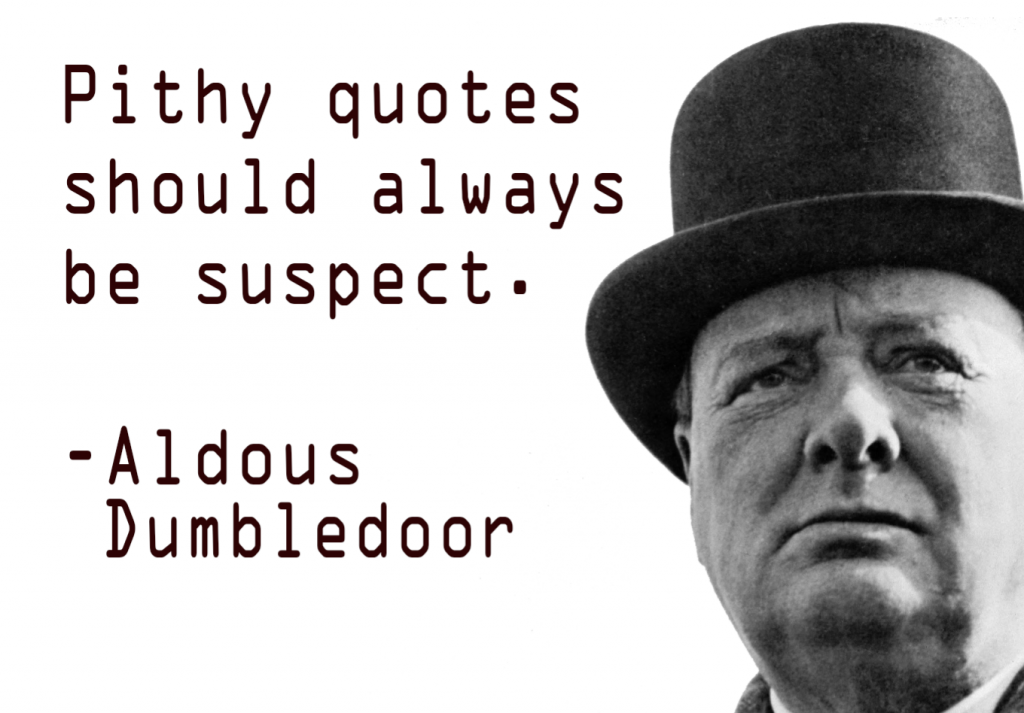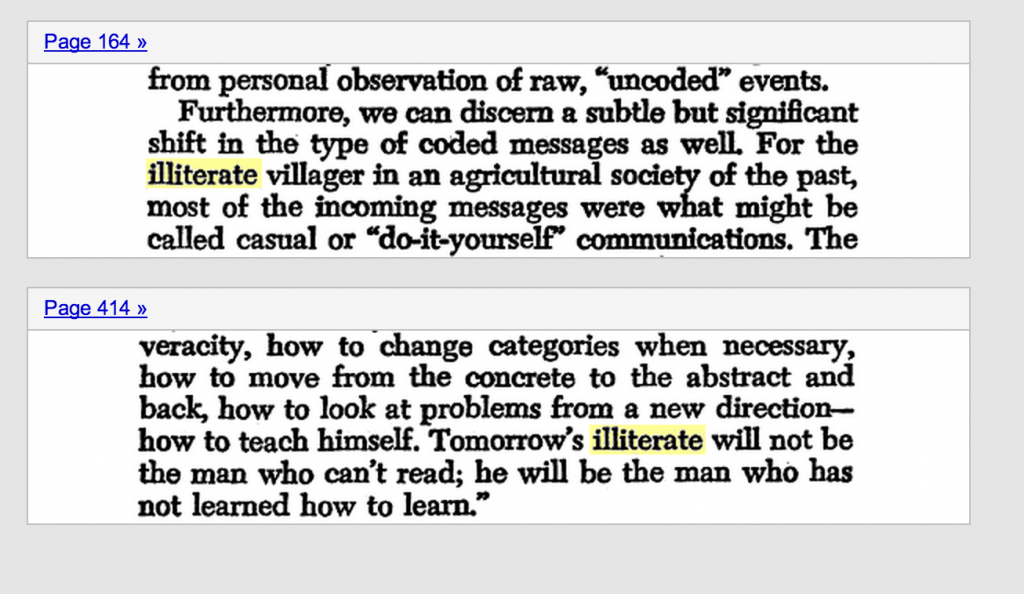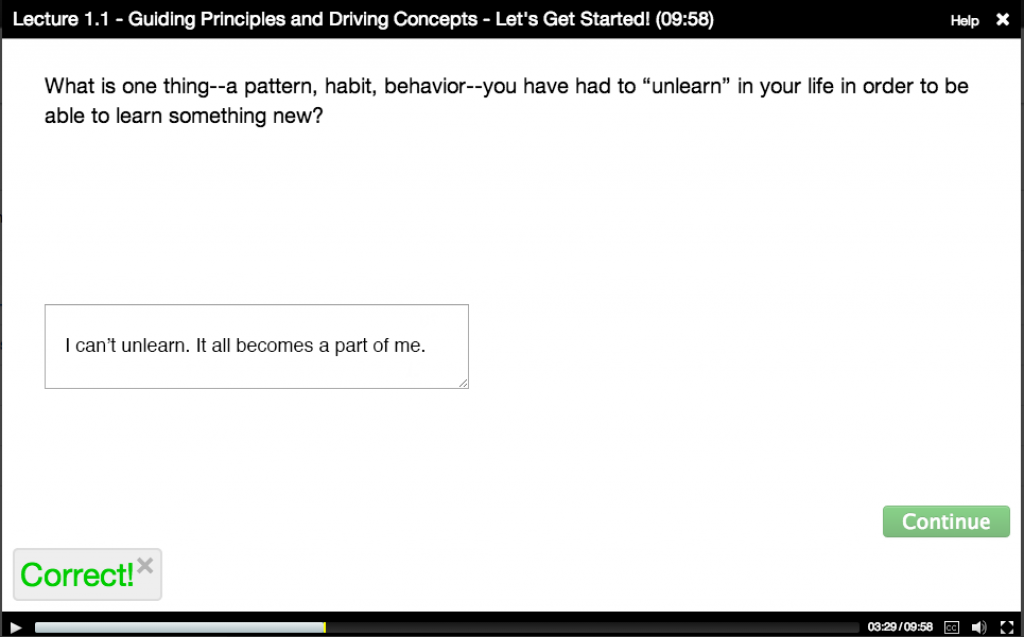
I have always been rather irritated1 by the quote attributed to Alvin Toeffler. It was used in the start of the History and Future of (Mostly) Higher Education MOOC. The participants are all supposed to be life long unlearners. Cute, pithy, tweetable but I fundamentally disagree with what the words mean. First, the quote-
The illiterate of the 21st century will not be those who cannot read and write, but those who cannot learn, unlearn, and relearn.
I went wandering to find more about Toeffler and the quote. Know thy enemy2 and all that. The book most often associated with the quote is Future Shock.
I find only two uses of the word “illiterate” in Future Shock. I also found a full PDF copy online that returned the same information. I won’t link to it here but you could find it without much issue. I’m amazed what I find by adding filetype:pdf to my Google searches.
Anyway, the quote below seems to be the relevant one and it turns out I’m not the first to wander down this path.
He does quote Gerjuoy who says something close, but better and harder to quote.
Psychologist Herbert Gerjuoy of the Human Resources Research Organization phrases
it simply: “The new education must teach the individual how to classify and reclassify
information, how to evaluate its veracity, how to change categories when necessary, how to
move from the concrete to the abstract and back, how to look at problems from a new
direction—how to teach himself. Tomorrow’s illiterate will not be the man who can’t read; he
will be the man who has not learned how to learn. (emphasis mine)”
Toffler does say.
By instructing students how to learn, unlearn and relearn, a powerful new dimension can be added to education.
In the end, it doesn’t matter much who said it. It is clearly very popular.
I think the quote would be better as –
The illiterate of the 21st century3 will
notbethose who cannot read and write, butthose who cannot keep learning, unlearn, and relearn.
I disagree fundamentally that you can “unlearn” anything. I’d make a bunch of dictionary references but most of them break down to the idea of “intentionally forgetting” something, of discarding the previous learning. Let’s assume it is possible to intentionally forget something.4 I tried to come up with any things I’d unlearned but found that with everything I could think of the information and ideas remained but I either reconsidered, augmented/extended, or re-contextualized. I didn’t forget the previous information/behavior, I built on it. More importantly, I don’t want to forget.
Don’t get me wrong, I’m not adverse to changing positions but I see it as evolution. Ancestors are important and seeing the pattern of change over time helps you understand all sorts of things. Unlearning feels too much like a modular exchange, a mechanical rather than organic process. Mike Caulfield put it well referencing Kahneman (maybe).
@twoodwar @criener Didn't Kahneman (or related) say that the old intution never goes away, we just build System II protections on top of it?
— Mike Caulfield (@holden) January 27, 2014
You can see some attempts to have this conversation on Twitter with a number of kind, patient souls. Most of what people suggested as “unlearning” was what I’d call learning (said early on by Jen)
Trying to think of an example of literal "unlearning" that has to go on as precursor to taking on new learning. Maybe too literal #FutureEd
— Tom Woodward (@twoodwar) January 27, 2014
1 Irrationally? Maybe.
2 I attribute this quote to Lee Cipolla.
3 and I’m not really sure about this whole first part but . . . I have to keep some context I guess. The seemingly implicit idea that actual illiteracy won’t matter is fundamentally wrong. You will be illiterate in the 21st century if you can’t read. We have not solved that problem.
4 Quick, forget about something.



To me, learning is a process of revisiting, revising or repeating, building on the ideas of others, and moving forward to apply new knowledge. Unlearning may be one of those sayings that need to be defined further in light of what learning is really all about.
I’m connecting your thoughts to those of James Lang in his recent Chronicle rant about “lifelong learning.” http://chronicle.com/article/Enough-With-the-Lifelong/144137
“All human beings with working brains are lifelong learners. That’s what our brains do: They constantly take in new information from our surroundings, compare and contrast it with what we already know, and make modifications. That’s learning, and we do it like breathing. James Zull, in his terrific book The Art of Changing the Brain, has an excellent passage on the fact that in our classrooms, learning always takes place, no matter how poorly we are teaching. It just may not be the learning we expect to happen.”
I think the underlying point for both you and Lang is that all too often when educationists speak of “learning” they are really speaking of “the learning we expect to happen.” Thus, as much as “unlearning” and “lifelong learning” are generally intended to be progressive, enlightened ideas, they actually serve to reinforce a deep-seated “thou shalt” and “thou shalt not” notion of learning.
Jim- The spam filter ate your comment initially.
That’s a great quote and your summary is spot on. The “life-long” part really irritates me as well but I was trying to get along. 🙂 Thanks again.